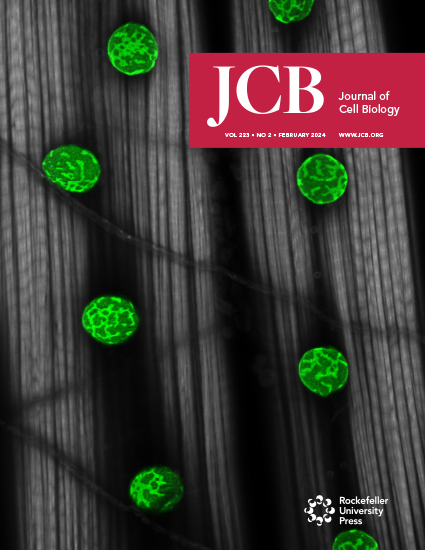CryoVesNet:用于低温电子断层扫描图中突触小泡分割的专用框架。
IF 7.4
1区 生物学
Q1 CELL BIOLOGY
引用次数: 0
摘要
低温电子断层扫描(cryo-ET)可揭示低至原子分辨率的细胞结构。然而,细胞低温电子扫描数据非常复杂,需要进行图像分割,以实现亚细胞结构的可视化和量化。由于低温电子显微镜数据中存在噪声和各向异性的分辨率,基于经典计算机视觉方法的自动分割通常无法达到令人满意的效果。神经元之间的通信依赖于充满神经递质的突触囊泡 (SV) 外渗。通过低温电子显微镜研究 SV 的空间组织及其相互连接,可以更好地了解外吞调节机制。准确的 SV 分割是获得忠实连接表征的先决条件。突触中存在数以百计的 SV,人工分割是一个瓶颈。为了解决这个问题,我们设计了一个由卷积网络和后处理步骤组成的工作流程。同时,我们还提供了一种交互式工具,用于准确分割球形囊泡。原则上,我们的工作流程可以分割任何细胞类型的球形囊泡以及细胞外和体外球形囊泡。本文章由计算机程序翻译,如有差异,请以英文原文为准。
CryoVesNet: A dedicated framework for synaptic vesicle segmentation in cryo-electron tomograms.
Cryo-electron tomography (cryo-ET) has the potential to reveal cell structure down to atomic resolution. Nevertheless, cellular cryo-ET data is highly complex, requiring image segmentation for visualization and quantification of subcellular structures. Due to noise and anisotropic resolution in cryo-ET data, automatic segmentation based on classical computer vision approaches usually does not perform satisfactorily. Communication between neurons relies on neurotransmitter-filled synaptic vesicle (SV) exocytosis. Cryo-ET study of the spatial organization of SVs and their interconnections allows a better understanding of the mechanisms of exocytosis regulation. Accurate SV segmentation is a prerequisite to obtaining a faithful connectivity representation. Hundreds of SVs are present in a synapse, and their manual segmentation is a bottleneck. We addressed this by designing a workflow consisting of a convolutional network followed by post-processing steps. Alongside, we provide an interactive tool for accurately segmenting spherical vesicles. Our pipeline can in principle segment spherical vesicles in any cell type as well as extracellular and in vitro spherical vesicles.
求助全文
通过发布文献求助,成功后即可免费获取论文全文。
去求助
来源期刊

Journal of Cell Biology
生物-细胞生物学
CiteScore
12.60
自引率
2.60%
发文量
213
审稿时长
1 months
期刊介绍:
The Journal of Cell Biology (JCB) is a comprehensive journal dedicated to publishing original discoveries across all realms of cell biology. We invite papers presenting novel cellular or molecular advancements in various domains of basic cell biology, along with applied cell biology research in diverse systems such as immunology, neurobiology, metabolism, virology, developmental biology, and plant biology. We enthusiastically welcome submissions showcasing significant findings of interest to cell biologists, irrespective of the experimental approach.
 求助内容:
求助内容: 应助结果提醒方式:
应助结果提醒方式:


